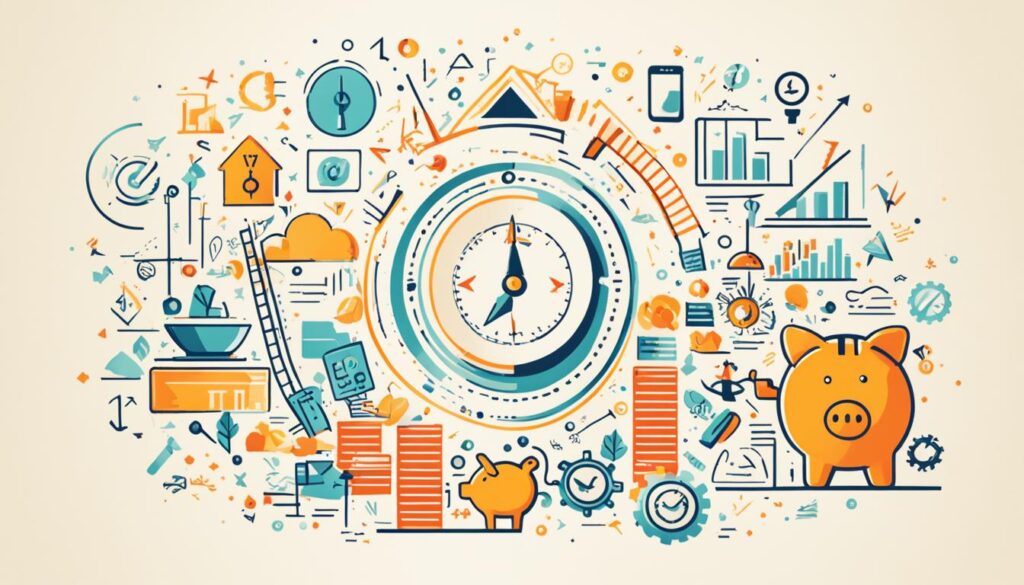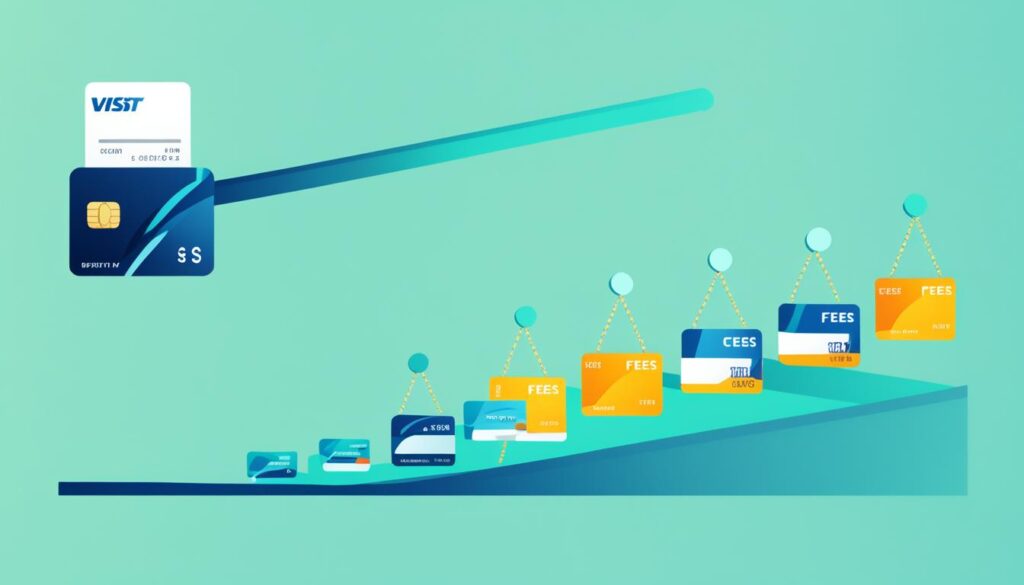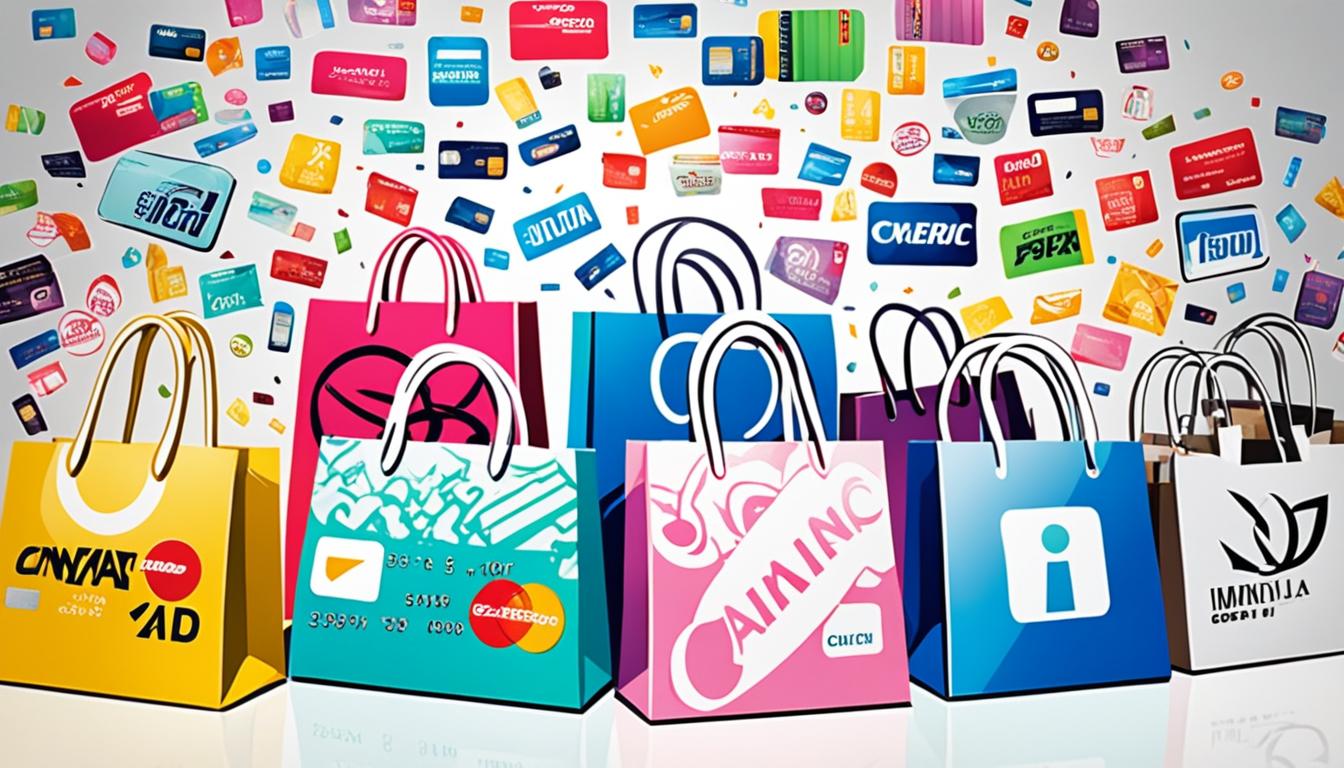Today, picking the right credit card is very important. It helps you meet your money goals. To do this, know your credit score and what you need financially. Look at different cards, their fees, rewards, and rules. This way, you find the best one for how you spend and your credit past. It helps you get more from your money.
Most great reward cards need good credit, so check yours first. Cards that build credit are good for those just starting or with bad credit. Cards that transfer balance offer 0% intro APR for 15 to 18 months, helping with debt.
Looking at low-interest cards can save money. They start around 17% APR. Smaller banks and unions often have rates 8 to 10 points lower than big banks. For those who travel a lot, there are cards that give miles for flights. Travel cards might give up to 3X points or miles for every dollar.
Rewards cards are best for those with good credit and can give big benefits. Cash back cards give 2 to 5 percent back on what you buy. Cards that earn points are flexible. They let you pick between cash back, travel, or goods. Checking your yearly card summary helps match your spending to the best card. Using financial tools well can up your credit perks.
Understanding Your Credit Score
Your credit score is very important when you choose a card. It shows if you can get different credit cards and their perks. A score is between 300 to 850 and tells how reliable you are. The big credit bureaus—Experian, Equifax, and TransUnion—give full credit reports. Amazingly, you can get free credit reports weekly from these bureaus at AnnualCreditReport.com.
Most top lenders look at your FICO Score or your VantageScore. These scores are also from 300 to 850. But some FICO scores for things like cars can go from 250 to 900. Payment history makes up 35% and how much you owe is 30%. So, it’s key to use credit wisely.
Checking your score often helps find mistakes and see progress. This aids your financial planning. How long you’ve had credit, new credit, and types of credit are big factors too. Knowing this can help you boost your score.
FICO says a score above 670 is good. The ranges are:
- Exceptional: 800-850
- Very good: 740-799
- Good: 670-739
- Fair: 580-669
- Poor: 300-579
A high score helps a lot in getting better cards. Good habits like paying on time help your credit score grow.
Identify Your Needs and Financial Goals
Finding the right credit card is about knowing what you need. You might want to increase your credit score or get rewards. It’s key to pick a card that fits how you spend your money. To start, use tools to look at your spending habits. These can be annual credit reports or budget tools from banks.
It’s key to pick a card that matches your money goals. Look closely at what each card offers. Make sure it meets your needs, like getting cash back, finding travel perks, or having lower interest rates.
Here are some credit card tips to think about:
- Decide if you’ll carry a balance or pay the full amount each month.
- Think about if the annual fee is worth the perks you’ll get.
- Search for introductory deals that might help with your quick money goals.
Choosing the right card takes strategy. It must fit with what you need now and your future money plans. By thinking it through, your credit card will be a helpful tool in your financial life.

Credit Card Selection: Types of Credit Card Options
When picking a credit card, knowing the different options is key. These choices fit various needs and money situations. They help people find the best one for their life and aims.
- Cash Back Credit Cards: These cards give perks like up to 2 percent back on what you buy. They help you earn rewards on daily spending.
- Business Credit Cards: Great for business owners, they offer up to 8X points on daily spending. Plus, 7X points on monthly stuff, useful financial tools. Learn more.
- Student Credit Cards: With no yearly fee, they are perfect for students starting with credit. A great step to building credit without extra costs.
- Secured Credit Cards: Ideal for improving your credit score. They need a cash deposit, like $500 for a $500 credit line. This helps build a better credit history.
- Rewards Credit Cards: For those who clear their balances often, these cards give points, miles, or cash back. For example, the Southwest Rapid Rewards® gives travel perks like free bags and tickets for a friend.
Knowing how these card types can help your money plan is important. Using these tools well can better your financial life. It helps you reach your money goals.
Examining Credit Card Fees and Interest Rates
When picking a credit card, it’s key to look at credit card fees and interest rates. These factors change how much you’ll spend over time. Knowing about the annual percentage rate (APR), how little you must pay back each time, and extra costs like yearly fees and fees for using your card abroad is important.

It’s also critical to think about late fees. Such penalties increase your total cost and can hurt your wallet. By looking carefully at these details, you can pick a credit card that fits your money plan and future goals.
In closing, never underestimate how much credit card fees and interest rates can affect what you’ll eventually pay. Always look closely at these financial tools. They should help with your credit usage, not make it harder.
Evaluating Reward Programs
When picking a credit card, reward programs are key. They offer things like cash back, points, or travel perks. Knowing how these reward programs fit with what you buy can make your card much more valuable.
- Reward rates for different spending categories
- The simplicity of the reward structure
- Potential value gained versus any associated annual fees
Getting the hang of credit benefits is crucial. This knowledge helps you make smart choices that match your financial planning targets. Picking a card that aligns with your spending habits helps you earn more. This way, you avoid extra costs.
Reading the Fine Print: Terms and Conditions
When picking a credit card, it’s key to get the terms and conditions. They show not just the main features but also hidden costs. Here are some credit card tips to guide you:
Look at the balance transfer fees first. They are usually 3% to 5% of the moved amount. There’s a minimum fee of $5 to $10 per transfer. Knowing this cost is important if you plan to transfer balances.
The foreign transaction fee is easy to miss. It’s about 3% of transactions made outside the U.S. Some cards, especially for travel, don’t have this fee. This is great news for people who travel a lot.
Introductory offers often have a 0% APR for balance transfers in the first 60 days. Know when this ends to avoid surprise charges. If you miss a payment, a higher penalty APR might apply. This can affect your current balance if you don’t pay on time.
Another key point is the cash advance policy. Taking cash advances usually has a higher APR than buying things. The interest starts right away, even if you pay the full balance. Also, be careful with deferred interest offers. If you don’t pay off the balance in time, you might get charged back interest.
Annual fees are common with many cards. They are charged when you get the card and every year after. Sometimes, the first year’s fee is not charged. But it’s good to know when you need to start paying.
Finally, check the rules for rewards programs. Different cards have different categories for earning bonus rewards. Knowing these details helps you get the most from your card.
Understanding the fine print makes your credit card a helpful financial tool. This way, you can avoid surprises and reach your money goals.
Credit Card Features and Perks to Look For
Modern credit cards offer lots of card features beyond the basics. Perks like sign-up bonuses, fraud protection, and travel insurance make a big difference. These features should match your lifestyle and spending habits.
- Sign-up Bonuses: Many credit cards give great sign-up bonuses. You could get cash back, points, or miles. This happens after you spend a certain amount in a set time.
- Fraud Protection: This important feature protects you if there are any unauthorized transactions. You get your money back fast.
- Travel Insurance: For those who travel a lot, this perk is a must. It covers trip cancellations, lost luggage, and accidents. This gives you peace of mind on your trips.
It’s also smart to look at reward programs. Some cards offer high rewards for dining out, cash back on groceries, or miles for flying. Picking a card that matches how you spend can bring huge perks. Also, look for zero foreign transaction fees if you travel abroad a lot.
Applying for a Credit Card: The Process
Applying for a credit card takes a few important steps. First, pick the right card for your money needs. Use financial tools to compare and choose well.
To apply, you’ll fill out a form with personal and job details. Make sure all your info is right to avoid issues. After you apply, the company will check your credit score.
Too many credit checks can hurt your credit score. So, apply smartly. Make sure your credit is good before applying. Tools like credit calculators help you see if you qualify.
After you get the card, understand its rules. Knowing what affects your credit score helps you make smart choices. This is key for good credit use.
Tips for Responsible Credit Card Usage
Good credit health requires careful credit card use. Here are some credit card tips for responsible spending and smart financial planning:
- Pay Bills on Time: Always pay credit card bills on time. This helps avoid fees and keeps your credit score high. Late payments can hurt your credit usage history.
- Maintain Low Credit Utilization: Try to use less than 30% of your available credit. This shows you’re spending wisely and helps your credit score.
- Adhere to a Budget: Following a budget every month is key. It prevents you from spending too much and manages money better.
- Avoid Impulse Purchases: Think before you buy with your credit card. Avoiding unplanned buys helps keep debt low and saves money.
- Monitor Charges Regularly: Check your statements often to make sure charges are correct. Catch mistakes or fraud early. Checking often is important for responsible credit card usage.
- Understand Reward Structures: Know how your card’s rewards work. Using rewards wisely can benefit you without causing debt.
Following these tips can help you manage your credit well. This is good for your financial planning and long-term money health.
Monitoring and Maintaining Your Credit Health
It’s important to check your credit reports and scores often. This helps you keep your credit health strong. If you find any mistakes, you can quickly fix them to protect your money health. Experian, Equifax, and TransUnion let you see detailed reports. These reports show how your actions affect your credit score. This is key when choosing cards and planning your money.
Knowing how using your credit card changes your credit status matters a lot. Making payments on time and keeping your borrowed amount low helps raise your score. A high credit score gets you better credit card deals. This makes your financial choices better. Checking your accounts often keeps your records right and stops wrong charges.
Having good money habits is essential for great credit health. Always pay on time. Plan and spend wisely. These actions build a good credit history. Focus on these habits to better your financial life now and for the future. Watch your accounts closely. Making smart choices helps you have a healthy money life. This supports your big financial dreams.

